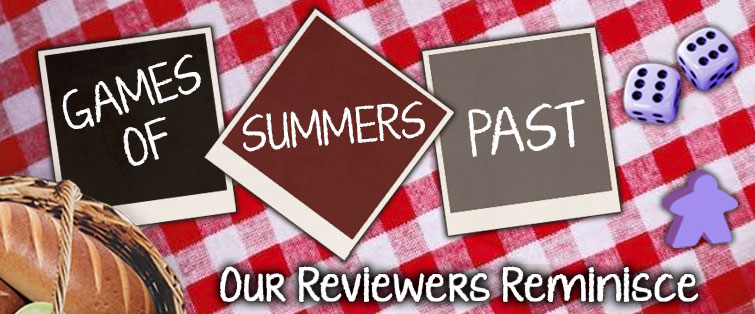Games of Summers Past
on Jun 22, 2017

Summer is in full swing- the days are hotter, longer, and - if you're lucky - a little more relaxed in terms of obligations and responsibilities. During the hotter months, my mind always turns back to summers past and how being a game player, there were often games that all but dominated the season. When school was out and you had a group of like-minded friends together, you could just get lost in a great game. Granted, most board games today aren't really designed for repeated, focused play but back then you could pick up something like the classic Avalon Hill titles like Civilization or Republic of Rome in June and you'd have virtually limitless entertainment until the first day of school. Not only would you have a game that rewarded intense focus, you'd also have a chance to really dig in and savor these great games. So with nostalgia in mind, I asked the Review Corner writers to tell us about some of their games of summers past, the games that defined the season in days gone by.
Michael Barnes
Review Corner Editor-in-Chief
Michael
There are two things that I remember most about the summer of 1996. One is sitting with friends in a Denny's and hearing about bombing at the Atlanta Olympics, which was just about five miles from where we were sitting. The other is Settlers of Catan. For the few years prior, my gaming time had been dominated almost entirely by Magic and RPGs, and my friends and I found that we really wanted to get back to playing some board games. I went into a game shop looking for something new to play and Settlers of Catan looked interesting. I bought it without doing any research - there were very few online resources other than the rec.games.board newsgroup, and I had seen it mentioned there so assumed it was worth checking out.
It wound up being THE game of the summer. It replaced Magic, and we played it every Sunday night. I actually wore that copy out, which is something I don't think people even do with the games they buy anymore. I wound up buying a German copy of the game because I liked the look of it so much better than the crusty old Mayfair edition. We did burn out a bit on it, but by then I was already importing board games from Germany. But then, in the summer of 1997, Catan came back. I started picking up the expansions, and we spent not only that summer but the next playing it. And yes, we preferred it with six players, Cities and Knights and Seafarers all together.
As for summer '17, it' all about Warhammer 40k 8th Edition, Age of Sigmar Skirmish, and Mechs vs. Minions.
Drew
As a working stiff, summer isn't especially important. But as a kid, it meant long, empty days perfect to be filled with epic gaming. Without school or homework to interfere, we could concentrate on the important stuff. And, in my youth, that often meant plays of Axis and Allies. The World War II war game is epic in scope, but with a simple enough ruleset that it was immediately understandable - with a few corner exceptions spawning some heated debates still referenced decades later. The longer play time allowed the experience to evolve organically and we created memorable attacks, feints, and counters.
In one instance, the attack on Pearl Harbor failed epically, and the United States was an immediate powerhouse. In another iteration of the war, the Russian Winter did little to quell the unstoppable Blitzkrieg; Moscow fell within a few short turns. But the most memorable was the little tank that could. A region with a single tank was invaded by a three tank force. That single tank survived and took out every one of the invaders even though he was outmatched and outnumbered. When I think back to those long gaming summer days, the memory of the "Hero Tank" is always near the forefront.
Kyle
During the halcyon days of my youth, lazy summer afternoons were filled with sprawling Magic the Gathering matches. We didn't have the money to buy tournament-worthy decks of course, but the beauty of Magic is that it's just as much fun played on the kitchen table with a few buddies as it is in competitive play. Our decks were cheap, wonky, and imbalanced, but they were ours. Whether you were playing with the kid who loved running a ridiculous green deck filled with crazy-big creatures or the annoying guy with the mother-may-I blue deck—okay, that was me—it was always a memorable time. I still pick up a set of theme decks or duel decks every block or so and battle it out when the mood strikes.
Craig
The summers of my youth meant freedom, swimming and monsters, and the end of every swim team practice combined the two perfectly when the coach and team headed to the deep end to play Jungle on Fire. The coach treaded water in the center and we gathered on one side. When the call of "Jungle on fire!" rang out, followed by him counting down, we had to dive in, avoid the "monster" and get to the other side without being tagged. Anyone caught became a monster themselves for the next round, and the game ended as all games did in those days, with one survivor remaining. Tension, glory and the task of learning to tread water for close to thirty minutes disguised as a game.
Inevitably our parents dragged us from the pool, but our grief was assuaged with the arrival of Survive: Escape from Atlantis, or as we knew it, Jungle on Fire: the Home Game. Build the island, strategically place your survivors, then start the doomsday countdown. We learned planning in the midst of panic, cooperation for mutual preservation, and the fun of sending sea monsters after your friends. My copy's an original so it's seen better days, but when my sister and her kids last visited a year ago, we shared the craziness with a new generation, and still never apologized for sinking each other's boats or steering sharks toward helpless swimmers. When I want to just feel like a kid again, that's my go-to game. Jungle on fire!
Nate
Way back in 2012, we were invited over to our friends' house to watch the opening ceremonies of the London Olympics. As is my habit, I brought some games with me, including the then-new reprint of Tom Jolly's classic game, Wiz-War. With the telecast playing in the background, my friend and I played game after spell-slinging game. We experimented with combos and variants, and when we finished we'd shuffle the cards and play again. After that night, Wiz-War accompanied me to just about every game night that summer. Its presence continued into future summers as well. I remember one session where some people bailed on a planned game of Dune because of a power outage. Those who showed up were more than happy to set up our cell phone lights and play Wiz-War into the night, long after every other light source was exhausted.
It's not hard to see why Wiz-War works so well in this setting. It's the sort of game whose rules are easily digested, and the play time allows the game to slot well at the end of a game night, or maybe the beginning, or maybe all of the times in between. It's the kind of light-hearted, knock-down-drag-out fight that would have felt at home with my high school buddies. But I'll remember it as one of summer's best games, and one of the best for any other season too.
Byron
Growing up, summer meant spending more time with my dad. There were trips to Disney parks, whitewater rafting, and as I got older, visits to historic sites like Antietam and Manassas. But on each of these visits, at least one night was spent playing social games like Taboo, charades, and my favorite, Balderdash. I have such fond memories of tricking my relatives with believable definitions or throwing the round just for the chance to crack them up that I hardly envy today's kids, who have a better class of party game to choose from. New social deduction games like Spyfall or improvisational storytelling games like Aye, Dark Overlord deliver the same opportunities for zany creativity as the games I used to love but ditch the awkward rules we mostly ignored anyway. Maybe I can finally convince him to throw out Taboo in favor of Codenames when I see him this summer.

 Customer Support
Customer Support  Subscribe
Subscribe 




 Account
Account  Wishlist
Wishlist 






